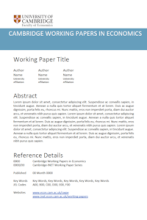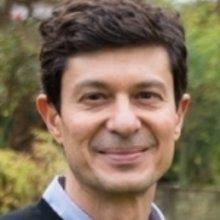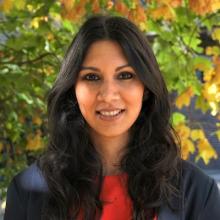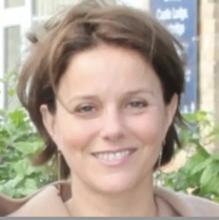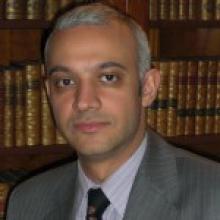There are many economic environments in which prospective buyers, acting sequentially, must choose whether or not to acquire an object. It is often observed that (rejection) decisions across buyers are correlated.
One explanation for this correlation is that buyers correctly, and independently, assess that the organ is of poor quality. An alternative explanation, which goes back to Banerjee (1992) and Bikhchandani et al. (1992) is that agents further in line herd behind their predecessors, ignoring their own assessment of the object's quality. Although the herding literature has advanced on many fronts since those canonical papers were published, there has been no test of the information inefficiency that lies at the heart of their analyses. We develop tests to detect information-based herding, together with a methodology to quantify its welfare consequences, which we apply to organ transplant decisions in the United Kingdom.
The organ transplant programme in the U.K. is organised around a nationwide network of centres (hospitals). When a deceased donor organ becomes available, all patients on the National Transplant Registry are assigned a priority rank based on a predetermined allocation algorithm. Transplant centres are offered the organ in order of their patients' priority, until the organ either is accepted or, having deteriorated with time, is no longer viable and is discarded. Currently, demand outstrips the availability of both livers and kidneys, the two organs that dominate transplantation activity in the U.K. and that constitute the focus of our analysis. National Health Service Blood and Transplantation (NHSBT) statistics indicate that, five years after being listed, approximately 20% of patients on the National Registry have either died or been removed from the waiting list as their condition has deteriorated below the minimum eligibility criterion for transplantation. Simultaneously, however, approximately 50% of livers and 30% of kidneys are discarded. Our methodology allows us to quantify the contribution of information-based herding to this relatively high discard rate.
We have developed a model of herding in organ transplant decisions and have verified its predictions with unique administrative data provided by the NHS Blood and Transplant (NHSBT) covering the universe of kidneys, livers, and pancreases that were donated in the U.K. between 2006 and 2016. Support from the Keynes Fund enabled us to complete the second stage of the research, namely to estimate the structural parameters of the learning model, and then to use the model to quantify the loss of viable organs due to herding.
In our original work plan, we intended to conduct the following counter-factual experiments: firstly, to predict the pattern of rejections and average quality of accepted organs when the information signals are common knowledge; and secondly, to predict the same outcomes when restricting the available information to the transplant centre’s own private signal (in which case there will be individual, but not social, learning). Subsequently, access to data on a recently-developed risk index of organ quality has allowed us to add a third counterfactual to our analysis: namely, to predict the same outcomes as in the first two counterfactuals under an intervention that makes this risk index available to all centres.
We find that herding is common and is an important contributor to the high rate at which organs are rejected (and subsequently discarded). However, herding does not raise discard rates much above the level that would be obtained if private assessments were made publicly available, with the (limited) information contained in predecessors' decisions substantially reducing false acceptances. The information loss highlighted by the canonical models of herding appears to be less serious in this setting, but this does not imply that information problems are absent: results from our third counterfactual simulation indicates that an intervention that makes the risk index of organ quality available to all centres would substantially reduce discard rates, while simultaneously improving the selection of organs.
Herding in Quality Assessment: An Application to Organ Transplantation
Herding in Quality Assessment: An Application to Organ Transplantation, Stephanie De Mel, Kaivan Munshi, Sönje Reiche and Hamid Sabourian, Cambridge Working Papers in Economics (2020)
There are many economic environments in which an object is offered sequentially to prospective buyers. It is often observed that once the object for sale is turned down by one or more agents, those that follow do the same. One explanation that has been proposed for this phenomenon, which goes back to Banerjee (1992) and Bikhchandani et al. (1992) is that agents making choices further down the line rationally ignore their own assessment of the object's quality and herd behind their predecessors. We develop novel tests to detect information-based herding, based on heterogeneity in agent ability, together with a methodology to quantify its welfare consequences, that are applied to organ transplantation in the U.K. We find that herding is common and is an important contributor to the high rate at which organs are rejected by transplant centers (and subsequently discarded). However, herding does not raise discard rates much above the level that would be obtained if private assessments were made publicly available. Instead, the (limited) information contained in predecessors' decisions substantially reduces the acceptance of bad organs. This is because in our application (i) high ability centers are often willing to deviate from the herd and follow their own positive signals, and (ii) sequences are exogenously terminated relatively quickly.
We have presented our research in Cambridge (Judge Business School), Penn State (Trade and Development Seminar) and Yale (Public-Labor Lunch). In the coming term, we will present the paper at Brown (Empirical Micro Workshop) and Michigan State (Department Seminar).
In the coming weeks we will submit the paper to a general interest economics journal, while simultaneously publishing the paper in the Cambridge-INET and Yale Economic Growth Center working paper series. We will then proceed to the second stage of the project, where we will work with our medical collaborators to write a policy-oriented paper for a Science journal. There are also additional theoretical aspects of the organ allocation problem that Reiche and Sabourian plan to work on in the future. We expect that this follow-up research, which is likely to have substantial policy impact, will continue for the next two years.
Banerjee, Abhijit V, “A simple model of herd behavior," The Quarterly Journal of Economics, 1992, 107 (3), 797-817.
Bikhchandani, Sushil, David Hirshleifer, and Ivo Welch, “A theory of fads, fashion, custom, and cultural change as informational cascades," Journal of Political Economy, 1992, 100 (5), 992-1026.

